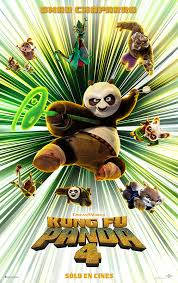
Kung Fu Panda 4
Director: Mike Mitchell (with Stephanie Stine credited as co-director)
Cast: Jack Black (Po), Awkwafina (Zhen), Viola Davis (The Chameleon), Bryan Cranston, James Hong, Ian McShane, Ke Huy Quan, Dustin Hoffman (reprising past roles)
Kung Fu Panda 4 (2024), directed by Mike Mitchell, offers a spirited #AnimatedAdventure #FamilyFantasy that expands the beloved kung-fu saga with fresh energy and heartfelt thematic evolution. After Po earns the mantle of Spiritual Leader of the Valley of Peace, he faces his most poignant challenge: to appoint a new Dragon Warrior. This quest introduces him to Zhen, a quick-witted fox bandit voiced by Awkwafina, and together they confront a shape-shifting sorceress known as The Chameleon (voiced by Viola Davis) who threatens the legacy of fallen kung-fu masters by dangerously cataloguing their abilities. Wikipedia+1AP News
Jack Black returns with his trademark exuberance, bringing a richer emotional core to Po, now torn between legacy and letting go. Awkwafina shines as Zhen, deftly blending swagger, humor, and vulnerability—creating an entertaining and surprisingly deep partner for Po. The ensemble cast—including Bryan Cranston, James Hong, Ian McShane, Ke Huy Quan (as Han), and Dustin Hoffman—rounds out the emotional resonance with familiar faces and reverent callbacks. Wikipedia+1Apple TV
Visually, the film maintains the series’ rich, expressive style but sprinkles in fresh aesthetics—from fog-wreathed urban vistas to luminescent lairs that evoke ethereal wonder. The narrative pacing is brisk and balanced, with action scenes that blend comic timing with martial elegance. Composer Hans Zimmer, alongside Steve Mazzaro, delivers a stirring score—featuring both orchestral depth and whimsical flair, including a memorable Tenacious D rock version of “…Baby One More Time” during the end credits. WikipediaPeople.com
At its heart, Kung Fu Panda 4 explores themes of succession, identity, and the bittersweet dignity of letting go. It acknowledges the painful yet liberating process of change, placing Po’s personal growth at the emotional core. While some critics noted mixed pacing and series fatigue, many cited the film’s warmth, humor, and refreshed dynamic between Po and Zhen as fulfilling highlights—and it stands as one of the more commercially successful and emotionally resonant sequels in the franchise.
Kung Fu Panda 4 (2024), directed by Mike Mitchell, offers a spirited #AnimatedAdventure #FamilyFantasy that expands the beloved kung-fu saga with fresh energy and heartfelt thematic evolution. After Po earns the mantle of Spiritual Leader of the Valley of Peace, he faces his most poignant challenge: to appoint a new Dragon Warrior. This quest introduces him to Zhen, a quick-witted fox bandit voiced by Awkwafina, and together they confront a shape-shifting sorceress known as The Chameleon (voiced by Viola Davis) who threatens the legacy of fallen kung-fu masters by dangerously cataloguing their abilities. Wikipedia+1AP News
Jack Black returns with his trademark exuberance, bringing a richer emotional core to Po, now torn between legacy and letting go. Awkwafina shines as Zhen, deftly blending swagger, humor, and vulnerability—creating an entertaining and surprisingly deep partner for Po. The ensemble cast—including Bryan Cranston, James Hong, Ian McShane, Ke Huy Quan (as Han), and Dustin Hoffman—rounds out the emotional resonance with familiar faces and reverent callbacks. Wikipedia+1Apple TV
Visually, the film maintains the series’ rich, expressive style but sprinkles in fresh aesthetics—from fog-wreathed urban vistas to luminescent lairs that evoke ethereal wonder. The narrative pacing is brisk and balanced, with action scenes that blend comic timing with martial elegance. Composer Hans Zimmer, alongside Steve Mazzaro, delivers a stirring score—featuring both orchestral depth and whimsical flair, including a memorable Tenacious D rock version of “…Baby One More Time” during the end credits. WikipediaPeople.com
At its heart, Kung Fu Panda 4 explores themes of succession, identity, and the bittersweet dignity of letting go. It acknowledges the painful yet liberating process of change, placing Po’s personal growth at the emotional core. While some critics noted mixed pacing and series fatigue, many cited the film’s warmth, humor, and refreshed dynamic between Po and Zhen as fulfilling highlights—and it stands as one of the more commercially successful and emotionally resonant sequels in the franchise.